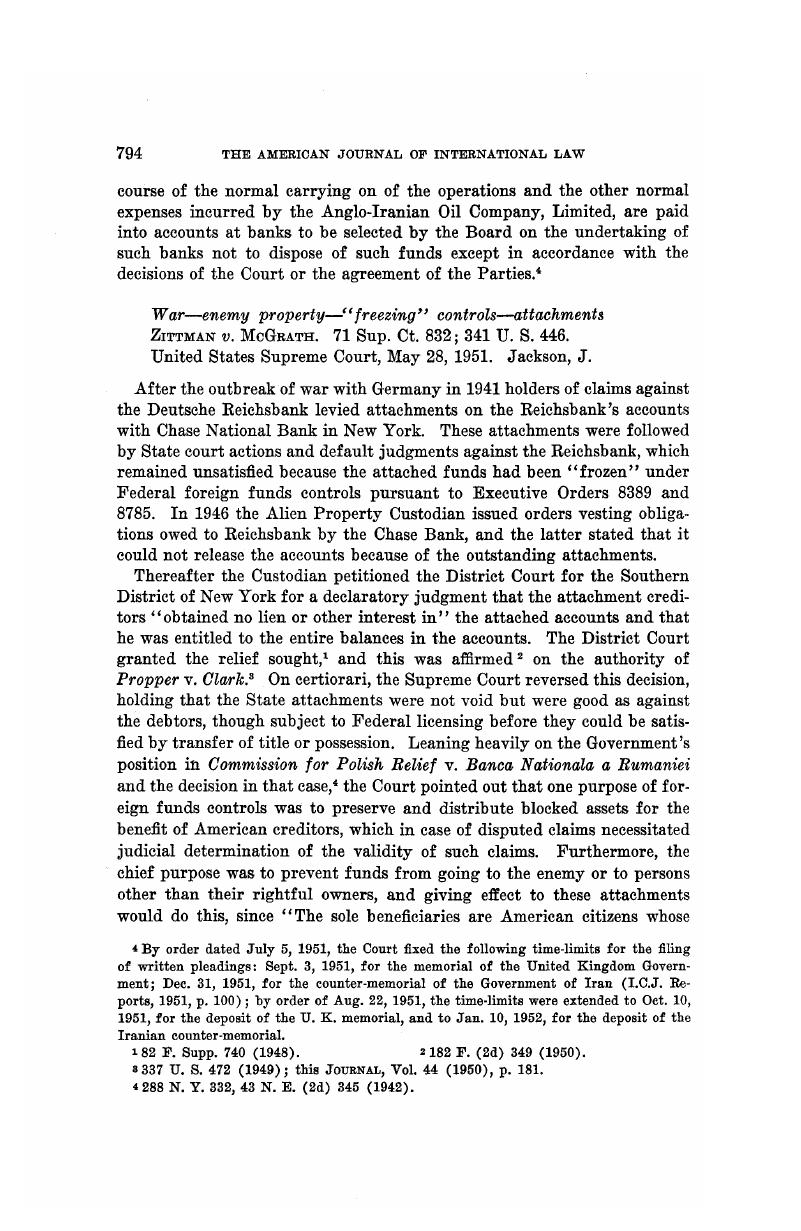Article contents
Zittman v. McGrath
Published online by Cambridge University Press: 20 April 2017
Abstract

- Type
- Judicial Decisions
- Information
- Copyright
- Copyright © American Society of International Law 1951
References
1 82 F. Supp. 740 (1948).
2 182 F. (2d) 349 (1950).
3 337 U. S. 472 (1949); this JOURNAL, Vol. 44 (1950), p. 181.
4 288 N. Y. 332, 43 N. E. (2d) 345 (1942).
5 This was held in the companion case of Zittman v. McGrath, 341 U. S. 471 (May 28, 1951), involving Reichsbank accounts with the Federal Reserve Bank*of New York, where the Custodian had ordered the latter bank to turn over the property for administration. Jackson, J., said that “the Custodian has power to possess himself of these funds and to administer them. To hold otherwise would be incompatible with the federal program.”
6 Douglas, J., concurred in a separate opinion; Clark, J., took no part in the decision; and Reed and Burton, JJ., dissented in part in an opinion by the former. See also McCloskey v. McGrath, 341 U. S. 475 (May 28, 1951), involving sheriff’s fees in these cases.
Shinsaku Nagano v. McGrath, 187 F. (2d) 753 (7th Ct, Feb. 26, 1951) held a resident Japanese merchant to be entitled to recover from the Custodian shares of stock in his business which he had purported to give to his wife, despite the Custodian's contention that there was an equitable estoppel against plaintiff. In Kaku Nagano v. McGrath, 187 F. (2d) 759 (7th Ct., Feb. 26, 1951) the wife was held entitled to recover the shares which had become hers and were taken by the Custodian, though she had retained Japanese citizenship and had lived in Japan most of the time since 1924 in order to look after children there who were not American citizens and not eligible to come to the United States. She was held to have retained “residence” in the United States with her husband, where she had lived more than seven years. The court held that her recovery was not prevented by the amendment of July 3,1948, which provided that no property of “any national” of Japan, vested in or transferred to any government official pursuant to the Trading with the Enemy Act, should be returned. The court said that she was “the owner of innocent American property, a friendly alien permanent resident of the United States and as such, entitled to Constitutional guarantees.” The court held that the 1948 statute did not repeal $ 9 (a), which gave the right to recovery from the Custodian, stating that “repeals by implication are never favored” and that Congress had refused to enact legislation specifically repealing that section. The court added: “though literally speaking, plaintiff is a citizen of Japan, she is not a citizen within the meaning of the word and its connotation recognized by judicial decisions. We ordinarily think of a citizen as one who owes allegiance to a state and has a reciprocal right to protection by it. It is obvious that plaintiff, a loyal American resident, unable to secure citizenship in this country, … owed no allegiance to Japan and had no reciprocal rights to protection by it… . Citizenship conveys the idea of membership in a nation, yet under the averments, we think it can not be said that plaintiff is, in any true sense, a member of the nation of Japan. Though ineligible to citizenship until recently, she was and is a permanent resident, owning untainted American property. Her position, we believe, is not within the conception of citizenship of a foreign nation which Congress had in mind in denning a national.”
- 1
- Cited by


